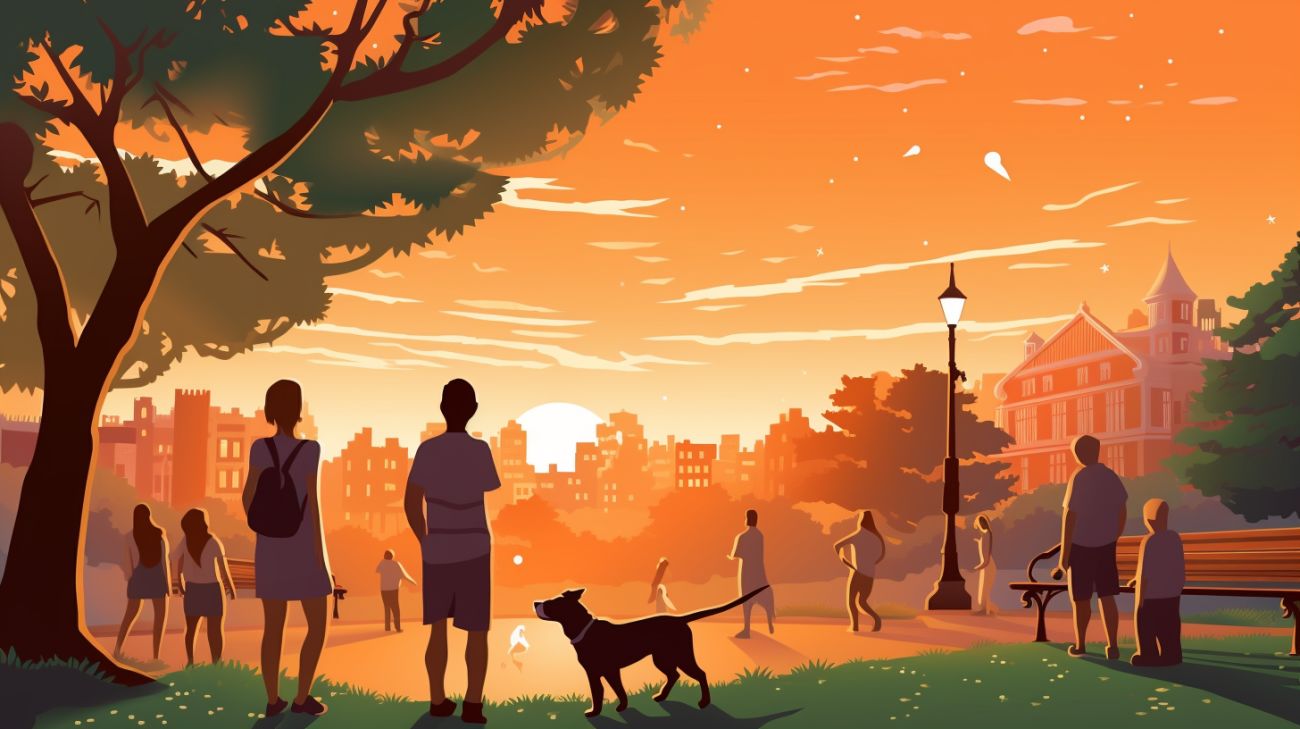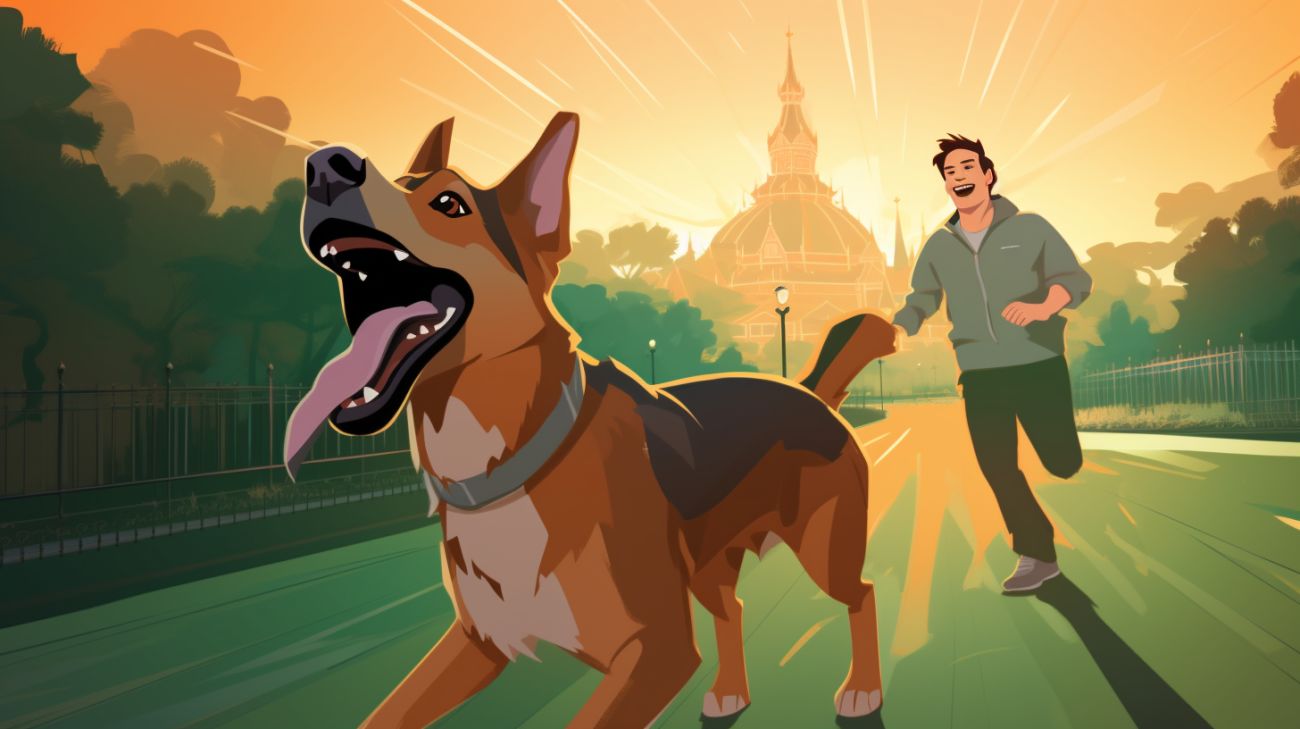Key takeaways
Searching at night for a lost dog can be an effective method because of the quieter conditions and our pups' reflective eyes.
Dogs are also more likely to come out of hiding at night and try and find their way back home, so they'll be easier to spot.
We offer our five top tips for how to find a lost dog at night, including a thorough physical search, how to be prepared, what to take with you, how to create a missing dog poster, and how a PetRadar search can help.
Quick Navigation
Why searching for your lost pet at night is effective

5 Top tips for finding lost dogs at night
1. Physically search
Your neighbors' garden: If you've got a sociable pup, they're probably just trying to find more friends. The best place to do that? Your neighbors! With permission, search their garden for clues.
Outbuildings: Outbuildings like garages, sheds, and bin stores are the perfect places for curious pups to explore. However, they are also easy to become trapped in. Check your own outbuildings and your neighbors', and keep the doors open.
Local park: If there's a park nearby where you often take your dog, they've probably memorized the route. If they've decided to take themselves on a walk, the likelihood is that they headed to the park.
Quiet backstreets: If your pup realizes they are lost, they may panic and become fearful. This means they'll avoid interactions with people or other animals and seek quiet areas to wait and hide. You may find your dog curled up on a backstreet or slinking down an alleyway trying to find their way back home.

Return to where they ran away: Even though our dogs can run for miles, it's unlikely they would have done this unless they were spooked. This means they're probably still near the trail that you lost them on.
Fields and farms: Now your dog is out of their territory, they won't understand their location. This means they are likely to go into 'survival mode,' focusing only on avoiding interactions with people and finding food and shelter. Big fields and quiet farms will be attractive if your dog is anxious and afraid.
Nearby towns: If you've got a confident dog who seems unfazed by most things in life, they may try to find people who can help them. They will be attracted to the sounds and smells of towns, meaning they could have wandered to the nearest town center.

2. Be prepared
Bring a flashlight: We know it's obvious, but it's always worth mentioning! Searching at night is pretty useless without a source of light, so be sure to bring a flashlight or two.
Wear reflective clothing: If you're searching with more than one person, make sure you wear reflective clothing so it's easy to find each other. You don't want to get lost alone in the woods at night!
Bring warm clothing: It will probably get pretty cold, and you'll likely be out for a couple of hours. Make sure you're prepared with layers of warm clothing so you don't have to give up halfway through! An added bonus is clothing like jumpers and scarfs will smell strongly of you, helping your pup recognize you.

3. Take treats and toys

4. Pin up missing dog posters
Photos of your dog (with a focus on memorable physical features)
Description of your dog's physical traits
Description of your dog's temperament and personality traits (shy, aggressive, friendly)
Where your dog was last seen
Your contact details


5. Start a PetRadar search

Our expertly-designed printable poster
Personal support and guidance
Statistics on how many people have seen your sponsored posts

Dos and don'ts for finding lost pets at night

Dos
Gently call their name: Calling your pup's name can help them find you, as they can recognize individual voices. However, make sure you keep a calm, quiet, and friendly tone and only use a few words they're very familiar with. Anything else might confuse and scare them.
Be patient: Both during the search and after you've found them, you need to be incredibly patient. When you're searching, don't leave any stone unturned, and don't be afraid to check the same place twice. If you find your pup, but they won't come to you out of fear, you'll need to sit with them for a while and gain their trust.
Ask for help: Because our dogs are curious animals that can run for miles, you may feel overwhelmed by the potential search radius. For this reason, ask for help. The more people searching, the better. But remember not to intimidate your dog by surrounding them with too many strangers!
Contact local animal shelters: It's important to make sure all local shelters are aware of your lost dog so they can contact you if they are handed in. Animal shelters can euthanize dogs that aren't claimed, so you can avoid this if they are aware of your lost pet.
Start a PetRadar search: If you start a PetRadar search, you can notify over 4,000 people in the area where your dog was lost through sponsored posts on social media. With more eyes on the lookout, you're more likely to find your pup after following up on reported sightings.

Don'ts
Approach your dog straight away: It's easy to become overjoyed at the sight of your dog and rush to greet them. However, if your dog is in survival mode, they may not recognize you straight away. So if you approach them immediately, it's possible they could run away again. Instead, let your dog make the first move.
Chase them: If you see your dog in the distance or they choose to run away from you again, our instincts can tell us to chase them. It's always out of love but not always the best move. This may frighten your pup even more and become distrustful of you.
Be loud or get frustrated: At night, the world is quieter. This means your dog will be more sensitive to the noises they can hear. For this reason, don't be heavy-footed or have loud conversations as you go. Your dog may pick up on this and run away or hide instead of coming to you.

FAQs
Where do lost dogs hide at night?
Most lost dogs will seek somewhere secluded and isolated to hide at night so they can avoid any interactions with other people or animals. This includes wooded areas, fields, farms, outbuildings in gardens, and quiet backstreets.
What to do if I lose my dog at night?
If you lose your dog at night, don't panic. It's actually easier to find a lost dog at night because of their reflective eyes and the lack of people around. Start by physically searching the area with the flashlight, then leave food and familiar-smelling clothing outside your house to help them find their way back to you. Also, remember to report your lost pet to local animal shelters.
Do dogs travel at night?
Lost dogs are more likely to travel at night because there are fewer people around. This means they will feel more confident coming out of hiding and trying to find their way back home.
How do I find my dog that ran away at night?
To find your dog that ran away at night, you'll need to start a thorough physical search. Use a flashlight and bring food and treats. Gently call their name as you look and move through the area quietly to make sure you don't scare them away.
How long can a lost dog survive?
A lost dog can survive for a long time. However, it does depend on their breed. More adaptable and independent breeds, like German shepherds and huskies, will be able to survive cold temperatures, hunt for food, and find shelter. However, smaller dogs won't be able to survive as long.
What do dogs do if they get lost?
If a dog gets lost, they will likely hide until they feel safe enough to try and find their way home.
Will a dog whistle help find a lost dog?
A dog whistle can help find a lost dog. However, if your pup has never heard the sound before, then they may not respond to it. The higher frequencies of the sound mean that dogs will be able to hear it further away than a human voice and be able to determine its location.
Can dogs see outside at night?
Dogs have excellent night vision, meaning they can see well outside when it's dark.
Do dogs get scared outside at night?
Depending on your pup's personality, dogs can get scared outside at night. If they are lost, then they may be frightened at night and choose to hide. Unusual noises, other animals, and other people can also scare dogs at night.



